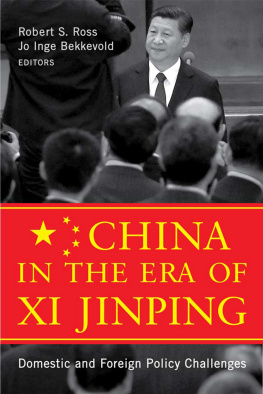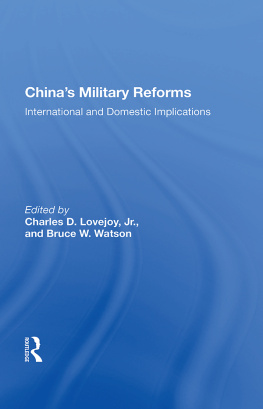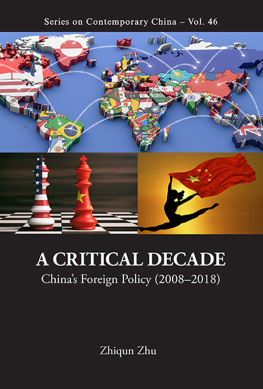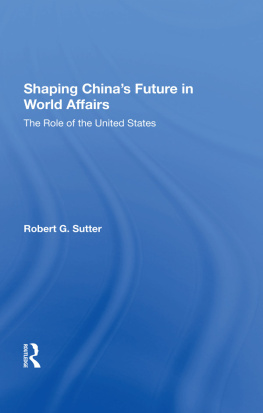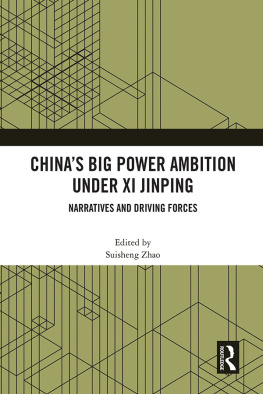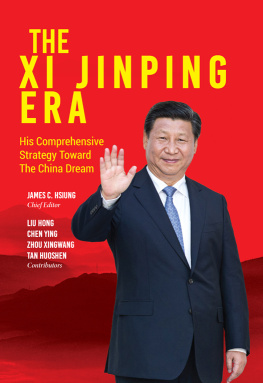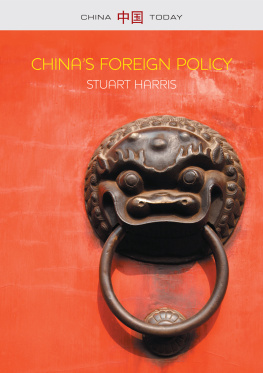Introduction
Chinas New Leadership in Domestic and International Politics
JO INGE BEKKEVOLD AND ROBERT S. ROSS
In 2010 China surpassed Japan to become the worlds second-largest economy. Based on the purchasing-power-parity valuation (PPP) of a countrys Gross Domestic Product (GDP), Chinas economy even surpassed the US economy in 2014. Based on nominal figures, Chinas economy is still less than 60 percent of the size of the US economy, but by 2019 it is estimated it will be 70 percent of the size of the US economy.
Chinas rise has been impressive, but it has also created challenges for the Chinese leadership, in both its domestic and foreign policies. China needs wise and mature leadership as never before. November 2012 witnessed Chinas second orderly power succession, when Xi Jinping replaced Hu Jintao as the general secretary of the Communist Party of China (CPC) and chairman of the Central Military Commission at the Eighteenth Party Congress. Whereas Jiang Zemin and the late Deng Xiaoping retained leadership of the Central Military Commission, Hu Jintaos retirement from all leadership posts enabled a smoother power transition and a stronger mandate for Xi Jinping. In March 2013 Xi formally ascended to the Chinese presidency and Li Keqiang became premier. Xi and Li have been chosen to captain the Chinese ship through 2022.
The Third Plenum of the Central Committee frequently provides the opportunity for Chinas new leadership to announce its policy priorities in a formal way. This was the case with Xi Jinping. At the Third Plenum of the Eighteenth Central Committee in November 2013, Xi signaled his economic policy preferences regarding the balance of state and market. He also announced the establishment of two new high-level policy coordination institutions, one for overseeing economic reform policies and one for enforcing security policies. Xi Jinping is heading both of these new institutions, which gives him a solid platform for launching his policy agenda. Xi Jinping has emerged as a leader who is stronger than his recent predecessors.
The three most urgent and interrelated domestic challenges faced by Chinas new leaders are: sustaining economic growth, fighting corruption, and maintaining social stability. Hu Jintao and former premier Wen Jiabao addressed the domestic challenges created by Chinas successes, but with only mixed results. At the National Peoples Congress held in March 2007, Wen acknowledged that Chinas economy was still unstable, unbalanced, uncoordinated and unsustainable. Over time these challenges have become more acute, and the next ten years will be critical for China. If Chinas economy continues to expand at 6 to 8 percent annual growth, China will most likely surpass the United States growth rate within the next ten to twenty years and eventually become the worlds largest economy. This scenario, however, will depend on a reform of Chinas economic model. If Xi Jinping wants to deliver on his China Dream, he and his lieutenants will have to exercise strong leadership and make bold decisions.
Chinas new leadership is also responsible for steering the Chinese ship in international waters. As a consequence of Chinas rise, this has become an increasingly challenging task. Chinas growth has increased expectations at home for a tougher stance in international affairs. Simultaneously, Chinas increasing capabilities and its evolving policies have created increasingly larger waves across the international system. Under Hu Jintaos leadership, Chinas rise and its nationalist diplomacy elicited increased apprehension among its neighboring countries and contributed to greater US efforts to consolidate its presence in Asia. What can we expect from China as a foreign policy actor in the coming decade? Foreign policy is often an extension of domestic policies and domestic structures. Does the Chinese leadership have a clear vision or grand strategy for utilizing Chinas emerging position as a global powerhouse? What is the Chinese worldview? Does the Chinese leadership view the world through lenses shaded by revisionist ideas or through lenses with a vision of China finding its rightful place as a great power within the current international order? How well will the new leadership handle growing nationalism, as influenced by Chinas patriotic education campaign and an outspoken and influential debate over Chinas foreign policy, which is currently taking place within Chinas Internet society?
Now that Xi has been secretary of the Chinese Communist Party and president of China for well over three years, we can develop an assessment of his policy priorities and his leadership abilities. The contributors to this volume take a close look at Chinas new generation of leaders and explore the challenges facing the new leadership, as it relates to both reforms at home and Chinas role in the wider world.
New Leaders, New Challenges
The challenges Xi Jinping and his Politburo colleagues face today are different from the challenges their predecessors faced. A brief look at the changing environment of Chinese politics and foreign policy making since the founding of the Peoples Republic clearly illustrates this point. When Mao Zedong proclaimed the founding of the Peoples Republic of China in October 1949, his country had been ravaged by Japanese occupation and a civil war that had lasted more than twenty years. The Nationalists had retreated to Taiwan with the intention of regaining power on the Chinese mainland sometime in the future. Chiang Kai-shek was never able to regain control over China, but his government represented China in the United Nations for another twenty-two years. In December 1949, with the world on the verge of a cold war, Mao traveled to Moscow to negotiate a friendship treaty with Joseph Stalin. A few months after returning from Moscow, Mao ordered his Peoples Volunteer Army troops across the Yalu River to support North Korea against the United States and to defend Chinas security. The Korean War brought the Cold War to Asia, and China was leaning to the one side: the socialist camp. During the next three decades China was able to enforce control of its borders but Chinese politics was marked by ongoing political upheavals and campaigns and the Sino-Soviet split in 1960 added further pressure on an already relatively isolated country.
When Deng Xiaoping emerged as the leading figure of Chinas post-Mao era in the late 1970s, he took charge of a country with a bureaucracy in tatters and an economy in dire straits. Chinas GDP in 1980 was one-fifth of Japans, half of the United Kingdoms, and less than one-tenth of the United States. China had been economically outrun by Japans rapid modernization in the 1960s and 1970s and also by the four tiger economies of South Korea, Taiwan, Singapore, and Hong Kong. In particular, the growth in the Chinese communities of Taiwan, Singapore, and Hong Kong stood in stark contrast to the situation on mainland China.
While Deng Xiaoping faced an ideological battle at home in trying to convince his Party colleagues to embrace the market economy and strengthen the states capacity to handle his proposed reform programs, his task was greatly supported by Chinas much-improved international standing. Even though the Sino-Soviet rivalry still played a decisive role in Chinese foreign policy, the Peoples Republic of China had joined the United Nations in late 1971 and US president Richard Nixons visit to China in 1972 had paved the way toward normalization of US-China relations. By the time Deng Xiaoping traveled to the United States in January 1979, full diplomatic relations between the two countries had been established and China was regarded as a partner in Cold War politics. The country was able to access credit, advice, and support from international organizations like the World Bank and the International Monetary Fund (IMF), and an increasing number of foreign enterprises were eager to take part in Chinas anticipated economic growth. The many Chinese living overseas soon became an important tool in Chinas economic turnaround. And in 1985 Deng Xiaoping declared that the Soviet Union no longer posed a threat to the country.

